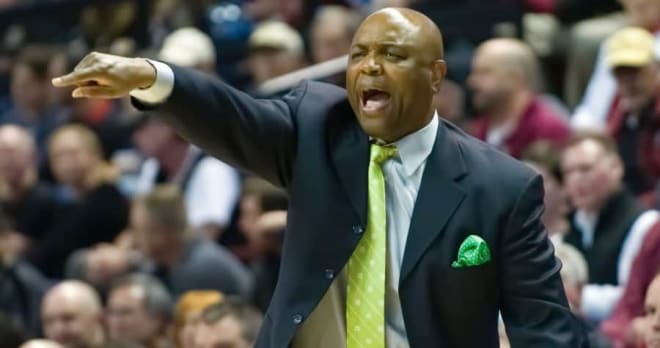Education, character define Hamilton's legacy more than wins, titles

Florida State coach Leonard Hamilton is well known nationally as a program-builder, taking over tough-to-win jobs like Oklahoma State, Miami and Florida State. Hamilton is also being recognized for how he is shaping teenagers and preparing them for life, whether it’s in basketball or off the court.
“You take teenagers at probably the most vulnerable but most important time of their life and you attempt to usher them into young adulthood,” Hamilton said. “Now, that covers a lot of things. You're trying to help them improve athletically and academically, but you're also working hard to try to help them improve socially. They’re all intertwined. You see so many people accomplish from an athletic standpoint but don't handle the social aspect. And here our culture is built on trying to take teenagers and nurture them to young adulthood.”
Hamilton is just getting started, a conversation about basketball players but one that is less about what happens on the court. He is a coach who has won 394 games in 20 seasons at FSU and 594 total in a 34-year career as a head coach. But he is also a mentor who has shaped lives and will be honored with the Joe Lapchick Character Award, which will be presented on Friday in New York City. Hamilton will be honored along with Big East commissioner Val Ackerman, former LaSalle coach Speedy Morris and former Belmont coach Rick Byrd.
The 74-year-old Hamilton doesn’t want to be evaluated based on the 12 NCAA Tournament appearances or the win-loss record.
“When you look back at your career, we know we are judged as coaches by how many games we win, how many NCAA trips we make, how many guys we put in the pros,” Hamilton said. “But in reality the percentage of guys who go play professionally is not really large when you look at the overall number of guys on your team. So you have more guys who are not playing in the NBA, who are not playing professionally, but so you really are judged by what those other guys are doing with their lives: Good citizens, good neighbors, husbands, fathers, people who are leaders of their family into their community. So that's more a reflection of the job that we have that we're trying to accomplish than the part that everybody sees on TV or they read about.”
The Lapchick Award “celebrates what is good in the game of basketball by honoring those who have demonstrated honorable character throughout their careers.” Lapchick was regarded as one the best centers in professional basketball in the 1920s and 1930s. After his playing career, he became the Head Coach at St. John’s and with the New York Knicks.
Hamilton has made earning a college degree his mission for all athletes who stay with the program for four years. Of the 75 seniors at FSU over the last 20 years, 73 of them completed their degrees. Hamilton and the staff keep up with players who leave early for the NBA or professional hoops overseas and encourage them to make degree completion a priority.
Solomon Alabi, who played at FSU from 2007-10, is one who wrapped up his degree in December 2020. Other Seminoles, like Dwayne Bacon, Mfiondu Kabengele and Von Wafer are among those taking classes around their basketball schedule toward a degree.
The numbers are improving across college basketball, with the NCAA reporting an 84-percent graduation rate. But graduation has always been the Hamilton way. Of his 31 seniors at Miami, 28 graduated.
Hamilton knows in recent decades there have been more and more players leave early for pro basketball but he intends for them to work toward degrees that will help them, whether they are able to play into their 30s or seek other careers.
“We have kids now, they left early in their life and they're still taking classes,” Hamilton said. “But that's your job. That's as much a part of the responsibilities you have as a coach as how many games you win in the ACC."
Hamilton was the first person in his family to earn a college degree, playing basketball on scholarship at Tennessee Martin. He describes both his mom and dad as bright but they both felt the burden to work early. Neither completed a high school degree.
“I had three brothers and a sister,” Hamilton said. “And I knew the only way I was going to get out of those circumstances was I had to get my education. My father always said, ‘I have absolutely no money for you to go to college, but you need to go get your degree. You got to figure that out.’ So right from the beginning, I understood that if I was going to be someone, go somewhere in life, I had to get my degree. And that's all I was focused on. But I also had the responsibility of setting the example. …
“Me going to college to get my degree changed the whole culture of my family,” Hamilton said. “So when I look at these guys who we are recruiting, they're in similar situations as to what I was in. I know how much it means for them, their family, their brothers, sisters and cousins and people in the community. For them to show, ‘I can do it. I did it. So you guys can do it too.’ And it's almost an absolute must. It's unthinkable to think that you're not going to get it … Most of these kids are first-generation college students for their family like I was. … Now everybody is planning on going to college as a result of the example I was setting for my family.”
Hamilton has also set an example of family for not just the players and coaches but everyone around the program. One of the team’s managers, Jared Lynn, battled cancer last season. Hamilton was emotional following one of the games when discussing Lynn, who he visited with during his recovery.
“I lost my grandmother to cancer,” Hamilton said. “I lost my father to cancer, my mother and both of my brothers. I know what it's like. And I have a tremendous respect and empathy for people who are going through what he's going through. And so it's just part of what I believe needs to be done. … We've always tried to have a family atmosphere where we will support one another.”
Follow The Osceola on Facebook
Follow The Osceola on Twitter
Subscribe to the Osceola's YouTube channel
Subscribe to the Osceola's podcasts on Apple
Subscribe to the Osceola's podcasts on Spotify
